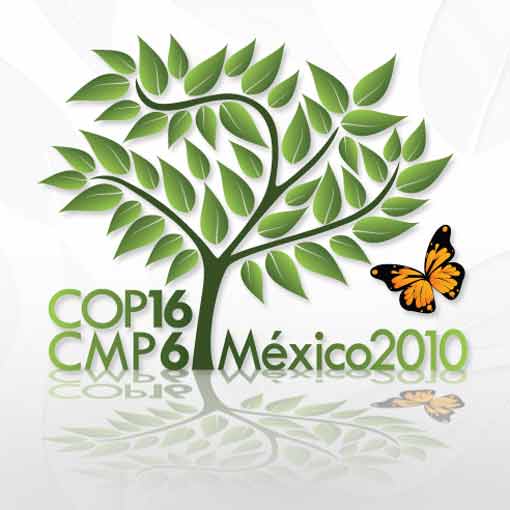 Cancun climate talks end with modest steps Cancun climate talks end with modest steps
An agreement to reaffirm support for the world's least developed countries to help them cope with global warming was a highlight of climate talks that ended early Saturday in Cancun, Mexico.
The Green Climate Fund would manage a "significant share" of the $100 billion a year pledged last year at the Copenhagen climate talks. However, the decision does not spell out sources for that funding, which will not be distributed until 2020.
Delegates from 193 countries meeting for the United Nations talks in Cancun also agreed on a plan to halt deforestation and pledged to share low-carbon technologies.
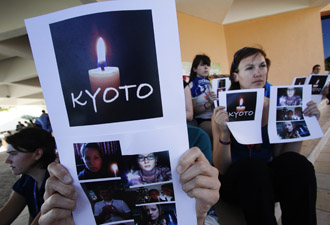
However, the Cancun accord deferred for another year the tough work of carving out deeper reductions in carbon emissions.
The 12-day gathering was held a year after the Copenhagen climate talks ended without any binding agreement on curbing greenhouse gases. The Cancun agreement does not specify what will happen once the Kyoto Protocol expires in 2012 — postponing the debate until the next scheduled climate talks in South Africa in 2011.
Read more: http://www.cbc.ca/world/story/2010/12/11/cancun-climate-talks.html#ixzz17qrLg34l
ON's advisory service
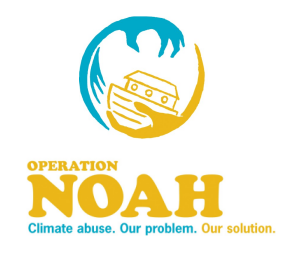 Operation Noah is offering a new advisory service to churches and communities. ‘Live the Future’ is a call to people of faith to take on a leadership role in their towns or cities, by living a transformed and rapidly de-carbonised life – in community. Such leadership is vital to help avert the threat posed to Creation by human-induced global warming. Operation Noah is offering a new advisory service to churches and communities. ‘Live the Future’ is a call to people of faith to take on a leadership role in their towns or cities, by living a transformed and rapidly de-carbonised life – in community. Such leadership is vital to help avert the threat posed to Creation by human-induced global warming.
“The kingdom of heaven is like a grain of mustard seed, which a man took, and sowed in his field; which indeed is the least of all seeds: but when it is grown, it is the greatest among herbs, and becometh a tree: so that the birds of the air come and lodge in the branches thereof......”
Matthew 13:31
The time for talk on climate change has ended. We acknowledge that the financial and ecological crisis has revealed a yearning in society for moral and spiritual leadership and for a sense of wholeness and connectedness.
Read more...
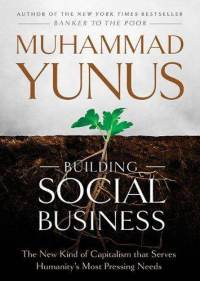 A new kind of capitalism has entered the 21st century. On June 28, 2010, the first Social Business Day has been celebrated in Dhaka, Bangladesh, under the auspices of the Yunus Centre and the broader Grameen family. In his third book, “Building Social Business”, Muhammad Yunus – CEO of the Grameen Bank and Nobel Peace Prize 2006 – provides for the various features of his new approach to business and development. A new kind of capitalism has entered the 21st century. On June 28, 2010, the first Social Business Day has been celebrated in Dhaka, Bangladesh, under the auspices of the Yunus Centre and the broader Grameen family. In his third book, “Building Social Business”, Muhammad Yunus – CEO of the Grameen Bank and Nobel Peace Prize 2006 – provides for the various features of his new approach to business and development.
In a nutshell, a social business is a non-loss non-dividend company whose sole objective is to address a social problem. The book describes the rationale behind the concept of social business as well as its features and its legal and financial frameworks. Besides, one of its merits is to provide for either the theoretical aspects and the practical applications of the model, showing its potential and its limits at the same time.
Building Social Business turns out to be written in a simple prose which captures the attention and the imagination of the reader, who finds herself immersed in the stories of some the most advanced joint ventures, like Grameen Danone, Grameen Veolia, Grameen BASF, Grameen Adidas. And, of course, the Grameen Bank itself is run as a social business.
Read more...
By Krishna Gurung
The Kevin Rohan Memorial Eco Foundation (KRMEF) was established in 2008 near Khokana, in the southwest of the Kathmandu Valley, Nepal. KRMEF is trying to save the local environment by using local manpower, local waste, and educating the local population about the benefits of protecting the environment. The project periodically runs free health and dental camps in a local school and looks forward to opening a free clinic very soon.
KRMEF has begun a pilot project focused on recycling waste found in and around the city of Kathmandu and utilizing the waste to produce sustainable fuel in the form of bio-briquettes and bio-gas. Waste bottles have also been collected and made into walls and windows. This ecological architecture will soon be implemented in the new clinic. These processes give work to many jobless, helpless and disabled individuals.
|
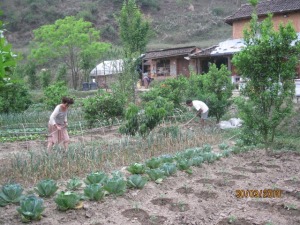
Working in the garden
|
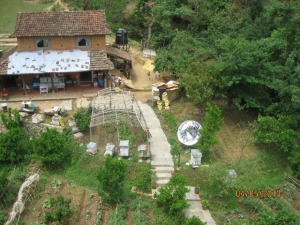
View of the farm house, solar cooker, orange trees, and bees
|
Presently KRMEF is sponsoring schooling for underprivileged children, has an eco-guest house, a volunteer program, a working organic/biodynamic garden, and is working to implement Waldorf techniques in a village school. We look forward to further developing our network to include treatments and education for physically handicapped children and to take care of the old, among many other activities.
Read more...
Green Age is so far the most important period that has witnessed a significant development in environmental consciousness. In this era of transformation, concerns over climate change, carbon emmissions and energy efficiency highlight the involvement of all stakeholders that play an essential role in ecological planning, architecture and design. The main focus of the symposium is to reduce the human footprint via design that minimizes pollution and consumption and to spread the ecological consciousness throughout the whole society.
In this regard, MSFAU Facult y of Architecture adopts an innovative mission in scientific, academic, technological and research fields by taking the responsability of further promotion and development of the topic.
The symposium that will be held on December 6,7,8, 2010 aims to raise consciousness by highlighting green ecological solutions in various scales; from built environment to natural environment, from society to individual. Therefore the new step is recognized as GREEN AGE.
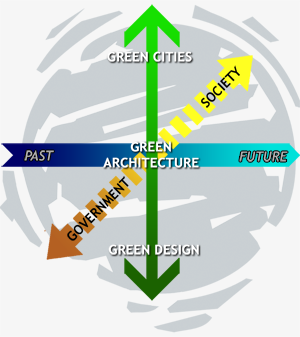
Read more...
Permaculture Design Certificate Launched At Palestinian Farm
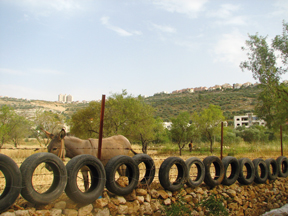 A collaboration of permaculture teachers has resulted in the offering of a Permaculture Design Certificate at Marda Permaculture Center in Palestine. Teachers and dryland experts from Australia joined with Marda founder Murad Alkhuffash, bringing together Arab and Australian students. Murad’s farm combines traditional Middle Eastern agricultural techniques with modern permaculture concepts. His goal is to empower Palestinians to produce healthy food for themselves without using any environmentally damaging fertilisers or pesticides. The site produces organic fruit and vegetables and incorporates rainwater harvesting, a covered nursery and compost production. A collaboration of permaculture teachers has resulted in the offering of a Permaculture Design Certificate at Marda Permaculture Center in Palestine. Teachers and dryland experts from Australia joined with Marda founder Murad Alkhuffash, bringing together Arab and Australian students. Murad’s farm combines traditional Middle Eastern agricultural techniques with modern permaculture concepts. His goal is to empower Palestinians to produce healthy food for themselves without using any environmentally damaging fertilisers or pesticides. The site produces organic fruit and vegetables and incorporates rainwater harvesting, a covered nursery and compost production.
For details view: www.thefarm.org/charities/i4at/marda/
 Abant Izzet Baysal University Architecture Department in Bolu, Turkey, hosted the third Gaia Education International Workshop on Sustainable Living. Abant Izzet Baysal University Architecture Department in Bolu, Turkey, hosted the third Gaia Education International Workshop on Sustainable Living.
The third pilot Ecovillage Design Education in Turkey organized by Guneskoy Ecovillage, Abant Izzet Baysal University Architecture Department, Abant izzet Baysal University Development and Research Foundation and Gaia Education hosted 40 students- some of them partly sponsored by previous participants of Gaia Education programmes in Turkey!
The workshop covered many aspects of social and ecologic design and included a presentation on Transition Towns. Faculty members included May East and Michael Shaw from Findhorn, Mehmet Tuncer, Hale Meric Karabekir, Inci Gokmen, Ali Gokmen and Deniz Dincel from Turkey.
 The response to this workshop from both the students and the organisers was remarkable. Specially the social dimension of sustainability attracted the attention of the participants as being a new concept for Turkey. The written evaluations from the workshop participants - the barometer of success- were extremely positive. Geographically, the workshop drew participants from around the nation. The participants profile included a cross-section of students, architects, urban planners, engineers, educators and social change activists. The response to this workshop from both the students and the organisers was remarkable. Specially the social dimension of sustainability attracted the attention of the participants as being a new concept for Turkey. The written evaluations from the workshop participants - the barometer of success- were extremely positive. Geographically, the workshop drew participants from around the nation. The participants profile included a cross-section of students, architects, urban planners, engineers, educators and social change activists.
Read more...
By J.E. Nigros
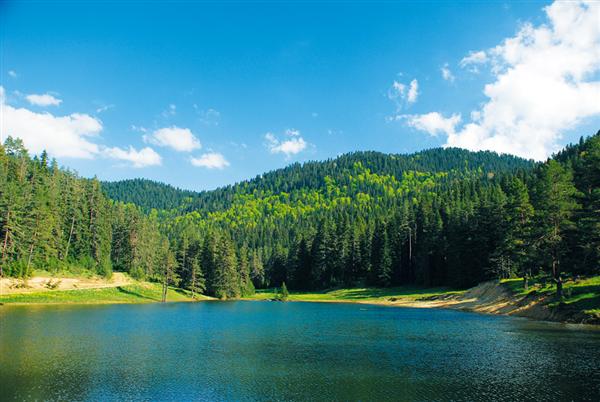
The people of Turkey have long been aware of the unique biodiversity of their country and the importance of preserving natural habitats. More than a millennium ago, the folk poet Dede Korkut wrote this prayer:
May our big shade tree never be cut down
May our forests never thin out
May our clear running streams never dry up
May we never be deprived of hope
May our wings never be broken
May our household fire keep burning
While Dede Korkut’s prayer seems to consign the fate of the environment to Allah and to chance, modern Turkish people know they must pass laws and enforce environmental policies to protect their environment.
Since the 1950’s, Turkey has been developing its environmental policies. Since 1997, the rules of the Convention of Biological Diversity have been in force. Turkey is a party to all relevant international conventions having to do with the conservation of biodiversity. According to the ever-evolving document, the National Biodiversity Strategy and Action Plan, Turkish legislation, however, has never been “harmonized from a consistent environmental point of view which presents frequent problems of overlap and lack of legal mandates for institutions.”
Read more...

KuzeyDoga Society
www.kuzeydoga.org
KuzeyDoga Society was established on January 28, 2008 in the province of Kars in northeastern Turkey. We are mainly interested in birds and their habitats, doing scientific research, organizing environmental education programs for kids and youth, raising awareness among local people about nature, providing training and capacity development opportunities for youth, promoting nature friendly tourism activities and cooperating with local, national and international organizations for the nature protection of Kars, Igdir, Ardahan, Artvin and Agri provinces in north-eastern Turkey.
Staff

Dr. Çağan Hakkı Şekercioğlu
President
Born in 1975 in Istanbul, Turkey. He studied biology and antropology at Harvard University and is currently a senior scientist at Stanford University Center for Conservation Biology, specializing in community-based conservation, ecology, ornithology, and tropical biology. His doctoral research focused on the causes and consequences of bird extinctions around the world. He has conducted ornithological fieldwork in Alaska, Angola, Colorado, Costa Rica, Ethiopia, Turkey and Uganda to investigate the ecological factors behind the extinction-proneness of certain groups, such as tropical understory insectivores. He has an extensive ongoing bird ringing and radio tracking study in Costa Rica to understand the factors behind the disappearance and survival of tropical forest bird species in human-dominated landscapes. He has compiled and continues to analyze a database of all the world's bird species to understand the distributions and determinants of avian life history traits and extinction correlates, and to assess the implications of avian extinctions on bird-mediated ecosystem processes and services, such as pollination, seed dispersal, and control of insect outbreaks. İn addition to his empirical research, he is currently conducting community-based conservation projects in Ethiopia and Turkey. His objectives are to integrate conservation education, research, capacity building and income generation, to increase the contribution of ecotourism, especially birdwatching, to community-based conservation in the developing world, and to improve the role of the private sector in the conservation of biodiversity. His ultimate goal is to prevent extinctions and consequent collapses of critical ecosystem processes while making sure that human communities benefit from conservation as much as the wildlife they help conserve.
Read more...
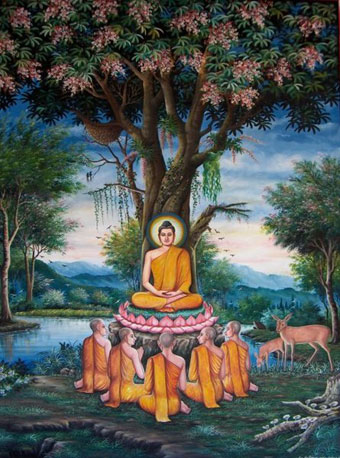 The Hindu has no authority over creatures of the earth. God (Brahman) is the efficient cause and nature, Prakrti, is the material cause of the universe. However, this division is non-dualistic in nature. They are one in the same, or perhaps better stated, they are the one in the many and the many in the one. The Hindu has no authority over creatures of the earth. God (Brahman) is the efficient cause and nature, Prakrti, is the material cause of the universe. However, this division is non-dualistic in nature. They are one in the same, or perhaps better stated, they are the one in the many and the many in the one.
Despite western assertion that Hinduism is polytheistic in nature, this sort of polytheism is actually monotheistic in nature. While the Divine is manifest in many, the many are all and no less than, but not equal to the Divine.
While Hindus are not given the sort of authority over nature and creation that Judeo-Christian God grants, they are subject to a higher and more authoritative resposiblity for creation. The most important aspect of this is the doctrine of ahimsa, non-violence. Faith in this doctrine is comprehensive, Yajnavalkya Smirti warns, "the wicked person who kills animals which are protected has to live in hell fire for the days equal to the number of hairs on the body of that animal."
This doctrine's most important aspect pertains to the belief that the Supreme Being incarnates in to forms of various species.
The Hindu belief in samsara, the cycle of life, death, and rebirth encompasses reincarnation into forms other than human. It is believed that one lives 84,000 lifetimes before one becomes a man. Each species is in this process of samsara until one attains moksha, liberation. The Hindu religious goal of moksha is not salvation, and does not require forgiveness, but detachment from the material world. Though one might argue that such a goal in essence rejects the natural world as having value, the Hindu goal is to liberate one from the self, from the illusion of the material world as being separate and individual.
Read more...
By Stan Rowe Published in The Structurist No. 39/40: pp.17-24. 1999/2000. Address of The Structurist is: P.O. Box 378, RPO University, University of Saskatchewan, Saskatoon, Sask. S7N 4J8 Canada. The editor is Eli Bornstein.
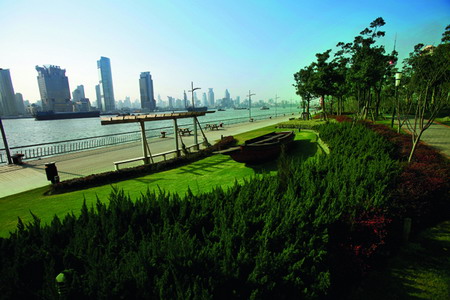 Cities are the rich nodes of civilization, the centers of every nation's culture, its commerce, arts, and sciences, which explains why so much attention is focused on their forms, their structures, and their internal functions. Much less attention has been paid to outer ties, relating the city ecologically to its larger geographic setting: the primary focus of this article. Cities are the rich nodes of civilization, the centers of every nation's culture, its commerce, arts, and sciences, which explains why so much attention is focused on their forms, their structures, and their internal functions. Much less attention has been paid to outer ties, relating the city ecologically to its larger geographic setting: the primary focus of this article.
Like coral reefs, cities are complex ecosystems: three-dimensional physical bodies, a close fusion of organic and inorganic components. Analogous to individual organisms, each volumetric city ecosystem depends not only on internal exchanges but also on outside exchanges, relying on the latter for the provision of necessary energy/materials and for the disposal of unnecessary wastes. The far-reaching effects of energy/material inputs and outputs constitute the ecology of these peculiar human-dominated ecosystems.
Confusion results when the inner functionings of cities, their physiology, is mislabelled their ecology. An example is the book, "The Ecological City" a collection of essays that largely deals with internal improvements of urban settlements by designing into them more of the undomesticated world.1 True, an inner ecology does exist in every urban setting, but it is not the ecology of the city; it is the ecology of people, the connections between inhabitants and the city ecosystem that envelops them.
At the ecology-of-cities level, within Earth's regions, problems are much less tractable than at the ecology-of-people level, within cities. Uncritically mixing the two dissimilar levels fosters an unwarranted optimism about solving city problems. Babylon and Tikal are reminders that city planning and city beautification are no hedge against the dangers of peripheral influences, especially those rendered virulent by neglect.
Read more...
|
 Anyone who has studied the global environmental movement has no doubt heard the term "Gaia". Gaia is a revival of Paganism that rejects Christianity, considers Christianity its biggest enemy, and views the Christian faith as its only obstacle to a global religion centered on Gaia worship and the uniting of all life forms around the goddess of "Mother Earth". A cunning mixture of science, paganism, eastern mysticism, and feminism have made this pagan cult a growing threat to the Christian Church. Gaia worship is at the very heart of today's environmental policy. The Endangered Species Act, The United Nation's Biodiversity Treaty and the Presidents Council on Sustainable Development are all offspring of the Gaia hypothesis of saving "Mother Earth". This religious movement, with cult-like qualities, is being promoted by leading figures and organizations such as former Vice President Albert Gore, broadcaster Ted Turner, and the United Nations and it's various NGO's. Al Gore's book "Earth in the Balance" is just one of many books that unabashedly proclaims the deity of Earth and blames the falling away from this Pagan God on the environmentally unfriendly followers of Jesus Christ. The United Nations has been extremely successful in infusing the "Green Religion" into an international governmental body that has an increasing affect and control over all of our lives. Anyone who has studied the global environmental movement has no doubt heard the term "Gaia". Gaia is a revival of Paganism that rejects Christianity, considers Christianity its biggest enemy, and views the Christian faith as its only obstacle to a global religion centered on Gaia worship and the uniting of all life forms around the goddess of "Mother Earth". A cunning mixture of science, paganism, eastern mysticism, and feminism have made this pagan cult a growing threat to the Christian Church. Gaia worship is at the very heart of today's environmental policy. The Endangered Species Act, The United Nation's Biodiversity Treaty and the Presidents Council on Sustainable Development are all offspring of the Gaia hypothesis of saving "Mother Earth". This religious movement, with cult-like qualities, is being promoted by leading figures and organizations such as former Vice President Albert Gore, broadcaster Ted Turner, and the United Nations and it's various NGO's. Al Gore's book "Earth in the Balance" is just one of many books that unabashedly proclaims the deity of Earth and blames the falling away from this Pagan God on the environmentally unfriendly followers of Jesus Christ. The United Nations has been extremely successful in infusing the "Green Religion" into an international governmental body that has an increasing affect and control over all of our lives.
So, what is this new cult of Gaia? It is basically a rehashed, modernized version of the paganism condemned by God in the Bible. Science, evolution theory, and a space age mentality have given it a new face, and made it sound more credible to a modern world, but it is the same paganism in all of its evils. There have been other religious movements that have presented similar revelations about the deity of a living earth, but Gaia has succeeded in uniting the environmental movement, the new age movement, Eastern religions, and even the leaders of many Christian denominations behind a bastardized version of paganism where the others weren't able to.
Read more...
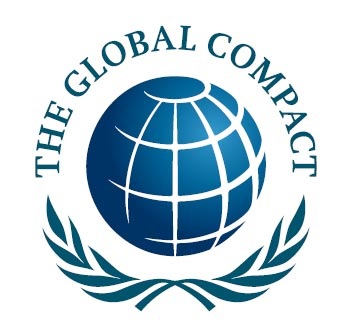 The Ten Principles The Ten Principles
The UN Global Compact's ten principles in the areas of human rights, labour, the environment and anti-corruption enjoy universal consensus and are derived from:
The UN Global Compact asks companies to embrace, support and enact, within their sphere of influence, a set of core values in the areas of human rights, labour standards, the environment and anti-corruption:
Human Rights
- Principle 1: Businesses should support and respect the protection of internationally proclaimed human rights; and
- Principle 2: make sure that they are not complicit in human rights abuses.
Labour
- Principle 3: Businesses should uphold the freedom of association and the effective recognition of the right to collective bargaining;
- Principle 4: the elimination of all forms of forced and compulsory labour;
- Principle 5: the effective abolition of child labour; and
- Principle 6: the elimination of discrimination in respect of employment and occupation.
Environment
- Principle 7: Businesses should support a precautionary approach to environmental challenges;
- Principle 8: undertake initiatives to promote greater environmental responsibility; and
- Principle 9: encourage the development and diffusion of environmentally friendly technologies.
Anti-Corruption
- Principle 10: Businesses should work against corruption in all its forms, including extortion and bribery.
|
|
 Cancun climate talks end with modest steps
Cancun climate talks end with modest steps







 A new kind of capitalism has entered the 21st century. On June 28, 2010, the first Social Business Day has been celebrated in Dhaka, Bangladesh, under the auspices of the Yunus Centre and the broader Grameen family. In his third book, “Building Social Business”,
A new kind of capitalism has entered the 21st century. On June 28, 2010, the first Social Business Day has been celebrated in Dhaka, Bangladesh, under the auspices of the Yunus Centre and the broader Grameen family. In his third book, “Building Social Business”, 


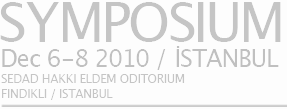

 A collaboration of permaculture teachers has resulted in the offering of a Permaculture Design Certificate at Marda Permaculture Center in Palestine. Teachers and dryland experts from Australia joined with Marda founder Murad Alkhuffash, bringing together Arab and Australian students. Murad’s farm combines traditional Middle Eastern agricultural techniques with modern permaculture concepts. His goal is to empower Palestinians to produce healthy food for themselves without using any environmentally damaging fertilisers or pesticides. The site produces organic fruit and vegetables and incorporates rainwater harvesting, a covered nursery and compost production.
A collaboration of permaculture teachers has resulted in the offering of a Permaculture Design Certificate at Marda Permaculture Center in Palestine. Teachers and dryland experts from Australia joined with Marda founder Murad Alkhuffash, bringing together Arab and Australian students. Murad’s farm combines traditional Middle Eastern agricultural techniques with modern permaculture concepts. His goal is to empower Palestinians to produce healthy food for themselves without using any environmentally damaging fertilisers or pesticides. The site produces organic fruit and vegetables and incorporates rainwater harvesting, a covered nursery and compost production. Abant Izzet Baysal University Architecture Department in Bolu, Turkey, hosted the third Gaia Education International Workshop on Sustainable Living.
Abant Izzet Baysal University Architecture Department in Bolu, Turkey, hosted the third Gaia Education International Workshop on Sustainable Living.  The response to this workshop from both the students and the organisers was remarkable. Specially the social dimension of sustainability attracted the attention of the participants as being a new concept for Turkey. The written evaluations from the workshop participants - the barometer of success- were extremely positive. Geographically, the workshop drew participants from around the nation. The participants profile included a cross-section of students, architects, urban planners, engineers, educators and social change activists.
The response to this workshop from both the students and the organisers was remarkable. Specially the social dimension of sustainability attracted the attention of the participants as being a new concept for Turkey. The written evaluations from the workshop participants - the barometer of success- were extremely positive. Geographically, the workshop drew participants from around the nation. The participants profile included a cross-section of students, architects, urban planners, engineers, educators and social change activists.

 The Hindu has no authority over creatures of the earth. God (Brahman) is the efficient cause and nature, Prakrti, is the material cause of the universe. However, this division is non-dualistic in nature. They are one in the same, or perhaps better stated, they are the one in the many and the many in the one.
The Hindu has no authority over creatures of the earth. God (Brahman) is the efficient cause and nature, Prakrti, is the material cause of the universe. However, this division is non-dualistic in nature. They are one in the same, or perhaps better stated, they are the one in the many and the many in the one.  Cities are the rich nodes of civilization, the centers of every nation's culture, its commerce, arts, and sciences, which explains why so much attention is focused on their forms, their structures, and their internal functions. Much less attention has been paid to outer ties, relating the city ecologically to its larger geographic setting: the primary focus of this article.
Cities are the rich nodes of civilization, the centers of every nation's culture, its commerce, arts, and sciences, which explains why so much attention is focused on their forms, their structures, and their internal functions. Much less attention has been paid to outer ties, relating the city ecologically to its larger geographic setting: the primary focus of this article. Anyone who has studied the global environmental movement has no doubt heard the term "Gaia". Gaia is a revival of Paganism that rejects Christianity, considers Christianity its biggest enemy, and views the Christian faith as its only obstacle to a global religion centered on Gaia worship and the uniting of all life forms around the goddess of "Mother Earth". A cunning mixture of science, paganism, eastern mysticism, and feminism have made this pagan cult a growing threat to the Christian Church. Gaia worship is at the very heart of today's environmental policy. The Endangered Species Act, The United Nation's Biodiversity Treaty and the Presidents Council on Sustainable Development are all offspring of the Gaia hypothesis of saving "Mother Earth". This religious movement, with cult-like qualities, is being promoted by leading figures and organizations such as former Vice President Albert Gore, broadcaster Ted Turner, and the United Nations and it's various NGO's. Al Gore's book "Earth in the Balance" is just one of many books that unabashedly proclaims the deity of Earth and blames the falling away from this Pagan God on the environmentally unfriendly followers of Jesus Christ. The United Nations has been extremely successful in infusing the "Green Religion" into an international governmental body that has an increasing affect and control over all of our lives.
Anyone who has studied the global environmental movement has no doubt heard the term "Gaia". Gaia is a revival of Paganism that rejects Christianity, considers Christianity its biggest enemy, and views the Christian faith as its only obstacle to a global religion centered on Gaia worship and the uniting of all life forms around the goddess of "Mother Earth". A cunning mixture of science, paganism, eastern mysticism, and feminism have made this pagan cult a growing threat to the Christian Church. Gaia worship is at the very heart of today's environmental policy. The Endangered Species Act, The United Nation's Biodiversity Treaty and the Presidents Council on Sustainable Development are all offspring of the Gaia hypothesis of saving "Mother Earth". This religious movement, with cult-like qualities, is being promoted by leading figures and organizations such as former Vice President Albert Gore, broadcaster Ted Turner, and the United Nations and it's various NGO's. Al Gore's book "Earth in the Balance" is just one of many books that unabashedly proclaims the deity of Earth and blames the falling away from this Pagan God on the environmentally unfriendly followers of Jesus Christ. The United Nations has been extremely successful in infusing the "Green Religion" into an international governmental body that has an increasing affect and control over all of our lives.  The Ten Principles
The Ten Principles 

